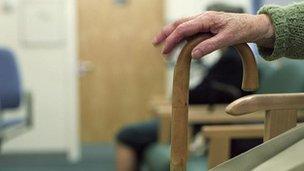Liverpool Care Pathway: Minister will listen to concerns
- Published

It is "completely wrong" for terminally ill patients to be put on a "pathway" to death without relatives being consulted, a health minister has said.
Norman Lamb has called a meeting of doctors and patients to discuss worries about the Liverpool Care Pathway - which can see water and food withdrawn.
A Conservative peer has called for an inquiry amid claims some people treated in this way could have survived.
Mr Lamb also defended the practice of paying hospitals for using the pathway.
He was reacting to reports in the Daily Telegraph, external that two third of NHS Trusts in England using the Liverpool Care Pathway regime have been paid sums totalling millions of pounds for reaching targets related to their use.
Relieving suffering
Responses to a Freedom of Information request by the paper have suggested that at least £12.4m has been paid out to trusts in the past three years.
The pathway was developed at the Royal Liverpool University Hospital and the city's Marie Curie hospice to relieve suffering in dying patients, setting out principles for their treatment in their final days and hours.
Mr Lamb said any payments made in connection with the pathway happened at a local level, without the government's involvement.
"Payments should only be made to encourage better care for people at the end of life," he told BBC Radio 4's World at One.
"Payments have been made to encourage and ensure that patients and their loved ones are involved in the critical discussions that take place at the end of life. If that is the result of the system, then that seems to me to be a good outcome."
The Lib Dem minister, responsible for social care, said his "sole interest" was making the final days of someone's life as comfortable and dignified as possible whether they chose to be in hospital, a hospice or at home.
"This (the pathway) is an approach improving the experience at the end of life. This is an approach supported by Macmillan and Marie Curie. Would those organisations really advocate a programme that denied dignity to people at the end of life."
'Right to complain'
Mr Lamb said he wanted to hear about cases where patients or their families had not been properly involved in, or informed about, how they were being treated and had convened a "roundtable" of clinicians and patients groups later this month to discuss the issue.
"Families are right to complain when that happens and it is that sort of approach which has to be challenged," he added. "I am absolutely determined myself to ensure we do challenge that."
"I want to hear where things have gone wrong. I want to ensure we address that absolutely, but a lot of good things have happened in recent years to improve the experience at the end of life."
Conservative peer Baroness Knight, who is calling for an inquiry into suggestions the Liverpool Care Pathway had accelerated some people's deaths, said she had heard of cases where people were deprived of water without their consent.
"One man actually rang the police and asked 'let me get some water'," she told BBC Breakfast. "That cannot be right. To die needing water is not a pleasant experience."
"What I think has happened is that a good idea at the beginning has translated into some very heartbroken people who have seen their relative die when actually they could have saved them."
But Dr David Nicholl, a consultant neurologist, told the BBC he was not aware of any financial targets connected to the pathway and that he believed hospitals were only concerned with getting more resources for good quality palliative care
"It is quite explicit that patients, where possible, should be fully consulted and their families consulted.
"Where there have been problems, I would say it has not been with the pathway but due to a lack of communication."
- Published1 November 2012
- Published31 October 2012
- Published18 October 2012